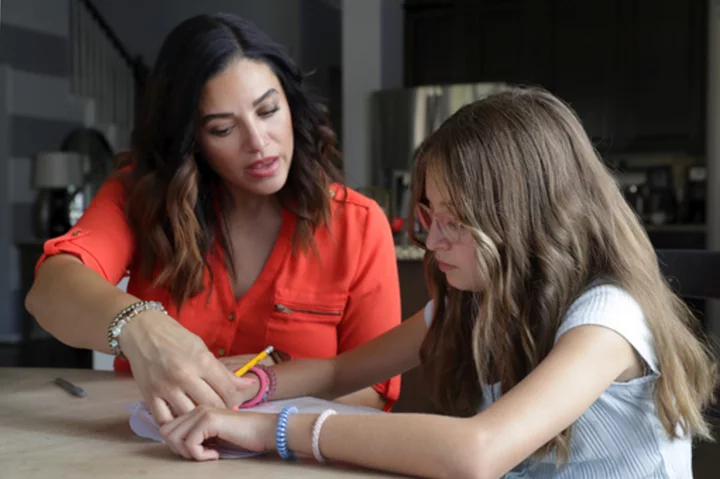
AMLO’s Insular Politics Predicted a Global Shift, But Will It Protect His Legacy?
On a Saturday afternoon in early July, Mexico City’s vast Zócalo square was packed wall-to-wall with supporters gathered
1970-01-01 08:00

Men experience imposter syndrome too – here’s how to overcome it
Imposter syndrome isn’t a disease, but it can do real damage to our confidence and self-esteem if it’s goes unchecked. And while it’s often associated with women, men can experience it too – as recently highlighted. Speaking on BBC Radio 4’s Last Word recently, Mike Parkinson revealed that his father, Sir Michael Parkinson – who died aged 88 earlier this month – dealt with “imposter syndrome” and “was wracked with self-doubt”. He went on to say that the well loved late chat show host, who interviewed the likes of Victoria and David Beckham and Muhammad Ali during his career, “didn’t have as much self-confidence as he appeared to have on TV”. The director also said that despite his father’s obvious success, he was “still very class ridden” and “very insecure”. These words will no doubt strike a chord with many. Here’s a closer look and imposter syndrome and what men can do to help manage it. What is imposter syndrome? “Impostor syndrome is not a mental illness. It is rather a term applied to the internal psychological experience of feeling like a fraud in a particular area in your life, despite evidence of success or external validation,” says Dr Jon van Niekerk, group clinical director at Cygnet Health Care. It is also a myth that men do not suffer from impostor syndrome... “It might come as a surprise to some, but it is fairly common experience, with 70% of people having at least one episode at some point,” he adds. “It is also a myth that men do not suffer from impostor syndrome. In fact, research has shown that if surveys are anonymous, there are similar levels of these symptoms between men and women. The difference is that men can find it more difficult to talk about these feelings.” What signs might they experience? Dr Elena Touroni, consultant psychologist and co-founder of The Chelsea Psychology Clinic, believes at its core, imposter syndrome is associated with “feelings of self-doubt sparking fears of being ‘exposed’ as a fraud, or diminishing genuine achievements and attributing them to luck rather than skill”. She adds: “On the surface, these internal battles might manifest as overworking to prove one’s worth, delaying tasks due to fear of imperfection, or an unending quest for validation.” As a result, van Niekerk says men could “compensate by overworking to achieve impossible standards they set themselves. Many people that have impostor syndrome are ‘overachievers’ and their personal and family life suffers. “Some people also self-sabotage their relationships, as they do not believe the deserve affection from others,” he adds. “If not managed well, it can ultimately lead to burnout and more severe mental health issues, like depression and anxiety.” What are the possible causes?There are various factors that play a role in imposter syndrome, especially as people may have different triggers for these feelings, and in different areas of their lives. “These feelings and beliefs can often be traced back to schemas – mental blueprints formed by our early experiences,” says Touroni. “These schemas shape our perception of ourselves, the world, and our place in it. When early experiences involve neglect, abandonment or overly critical parents/caregivers, it can lead to a lasting belief of not being ‘good enough’.” How can men overcome imposter syndrome? Reflecting on your strengths and positive past experiences is often a great place to start. “It is important to not just accept self-defeating thoughts. If you experience these thoughts, it is important to note them and remind yourself of why you are in a particular position, and what past accomplishments you have had,” says van Niekerk. “Once you open up, you will be surprised how many people struggle with similar thoughts. Usually, these settle down once you have been in a particular role for some time, but if they impact on you pursuing your goals or your relationships, it might be helpful to speak to a therapist.” Touroni adds: “Imposter feelings tend to run deep. But, with dedication and the right support, they can be challenged and changed. A therapist can help you unearth the origins of these beliefs, challenge their accuracy, and cultivate healthier, more empowering perspectives and coping mechanisms.” Read More Charity boss speaks out over ‘traumatic’ encounter with royal aide Ukraine war’s heaviest fight rages in east - follow live 8 of the coolest plants for shady gardens This is how stress affects different parts of the body Curls feeling frazzled? 6 ways to repair summer hair damage
1970-01-01 08:00

This Airline Has Added Child-Free Sections on Long-Haul Flights
How much would you be prepared to pay to ensure there are no screaming babies, tearaway toddlers or
1970-01-01 08:00

The math problem: Kids are still behind. How can schools catch them up?
Across the country, schools are scrambling to catch up students in math as post-pandemic test scores reveal the depth of missing skills
1970-01-01 08:00

Florida Braces for Disaster With Idalia Set for Explosive Growth
Florida is bracing for a major hurricane that is poised to bring life-threatening winds and storm surge to
1970-01-01 08:00

Adele reveals she collapsed backstage at Las Vegas residency over a spinal condition
Adele has opened up about her health after experiencing a flare-up of her spinal condition during her Las Vegas residency. During one of the “Hello” singer’s recent concerts - as part of her “Weekends with Adele” residency at The Colosseum at Caesars Palace - she explained to fans that before stepping on stage, she had fallen and was unable to move due to a sciatica attack. A sciatica flare-up comes from the sciatic nerve when it is compressed or irritated. When this happens, a person can experience pain that radiates from their lower back all the way down to their feet. “They picked my whole body up off the floor,” Adele explained to the crowd, according toThe Sun. The singer also revealed to the audience that she had to take a break mid-show over the weekend, saying: “I am going to sit down and rest my sciatica.” This isn’t the first time the “Easy on Me” singer has spoken openly about her health. During a performance on New Year’s Eve last December, Adele struggled to walk across the stage as she explained her chronic back pain and sciatica. “I have to waddle these days as I have really bad sciatica," she said at the time. Not only was she struggling to walk, but she also shared that she was performing with a disintegrated disc in her spine. “Is anyone else kind of my age starting getting bad knees? I have got really bad sciatica in my left leg and my L5 disc is not f***ing there anymore. It’s worn away,” she said back in February. The L5 spinal nerve provides sensation to the outer side of the lower leg, the upper part of the foot, and the space between the first and second toe. The nerve also controls hip, knee, foot and toe movements, according to the Cleveland Clinic. The sciatic nerve consists of the L4 and L5 nerves plus other sacral nerves, the website states. In an interview with Elle last year, Adele also said that she slipped her L6 disc when her son, Angelo, jumped out to scare her as she came out of the bathroom. The singer previously toldThe Face magazine in a November 2021 interview that her back issues go back to her teenage years. “I slipped my first disc when I was 15 from sneezing. I was in bed and I sneezed and my fifth one flew out. In January, I slipped my sixth one, my L6. And then when I had a C‑section, my core was useless," she said. Adele explained that she had lived with back pain for most of her life, and that her flare-ups occurred when she was stressed or continuously sitting with bad posture. However, she revealed that key to improving her symptoms was regularly working out. “Where I got my tummy strong, down at the bottom, which I never had before, my back doesn’t play up as much,” Adele said. “It means I can do more, I can run around with my kid a little bit more.” Read More Adele halts show to rebuke security guard hassling a fan: ‘Leave him alone’ Adele says she wants to have a baby with boyfriend Rich Paul ‘soon’ Miley Cyrus was ‘thinking of Adele’ while writing new song ‘Used to Be Young’
1970-01-01 08:00

Amazon is raising free-shipping minimums for some customers who don't have Prime memberships
Amazon has been quietly raising the amount some customers must spend on its site to get free shipping
1970-01-01 08:00

The Best Pumpkin-Carving Tools and Accessories, According to an Expert
Maniac Pumpkin Carvers’ co-founder Marc Evan shares his tips, tricks, and picks for the best pumpkin-carving tools.
1970-01-01 08:00

25 Top-Rated Products To Make Your Dorm Room Amazing
Help the college student in your life personalize their new space with these dorm room essentials that’ll see them through freshman year and beyond.
1970-01-01 08:00

Why Artificial Banana Flavor Doesn’t Quite Taste Like Bananas
Despite what people often claim, the Gros Michel isn't to blame.
1970-01-01 08:00

12 of the Fiercest Real-Life Pirates in History
They pillaged, they invaded, and they obeyed only the sea laws they made up as they went along.
1970-01-01 08:00

Pastrami vs. Corned Beef: What's the Difference?
The two brined meats are both delicious, but they're prepared in very different ways.
1970-01-01 08:00
